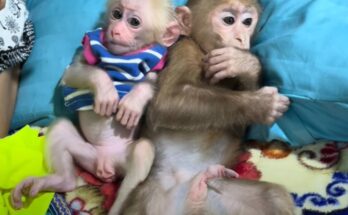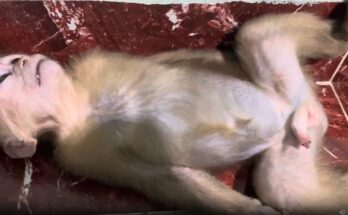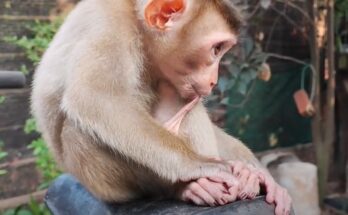Certainly! Here’s an expanded 500-word version of the title, along with a new, more polished title.
Original Title: Monkeys like to play with their own genitals
New Title: Understanding Self-Grooming and Behavioral Traits in Monkeys
Expanded Version (Approximately 500 words):
Monkeys are highly intelligent and social animals known for their complex behaviors and interactions within their groups. One aspect of their behavior that often draws attention is their tendency to engage in self-grooming, which includes activities such as playing with or cleaning their genitals. While this behavior might seem peculiar or amusing to humans, it serves important biological and social functions for primates.
Self-grooming is a natural and essential activity for monkeys. It helps them maintain hygiene by removing dirt, parasites, and dead skin from their bodies. When it comes to their genital area, grooming can help prevent infections and discomfort, which are crucial for their health. In many monkey species, grooming is also a social activity that reinforces bonds between individuals. For example, grooming a fellow monkey’s fur or genital area can foster trust and social cohesion within the group.
It’s important to understand that such behaviors are normal and instinctual rather than inappropriate or abnormal. In fact, grooming behaviors, including those focused on the genital region, are observed across many primate species and are considered vital for their well-being. They also play a role in reducing stress and anxiety, providing comfort similar to how humans might engage in personal hygiene or comforting routines.
From a developmental perspective, young monkeys often explore their bodies out of curiosity, which is a natural part of learning about themselves and their environment. As they grow older, these behaviors become more socially regulated and integrated into their daily routines. In adult monkeys, genital grooming may also be associated with reproductive behaviors or social hierarchy, with dominant individuals sometimes engaging in or receiving grooming as a sign of status.
While human observers might interpret such behaviors humorously or with curiosity, it’s essential to recognize their biological significance. These behaviors are part of the natural repertoire of primate behavior and contribute to their physical health and social structure. They highlight the importance of self-care and social bonding in animal societies.
In conclusion, monkeys’ tendencies to groom their genitals are normal, healthy behaviors rooted in their biology and social structure. These activities play a critical role in hygiene, health, stress relief, and social bonding. Understanding these behaviors within their natural context can help foster greater appreciation and respect for these intelligent creatures and their complex social lives.
Would you like me to help craft an even more detailed article or provide a different type of content?


